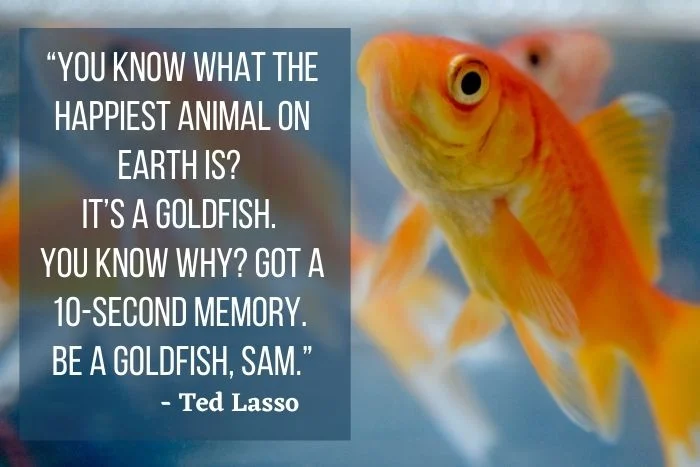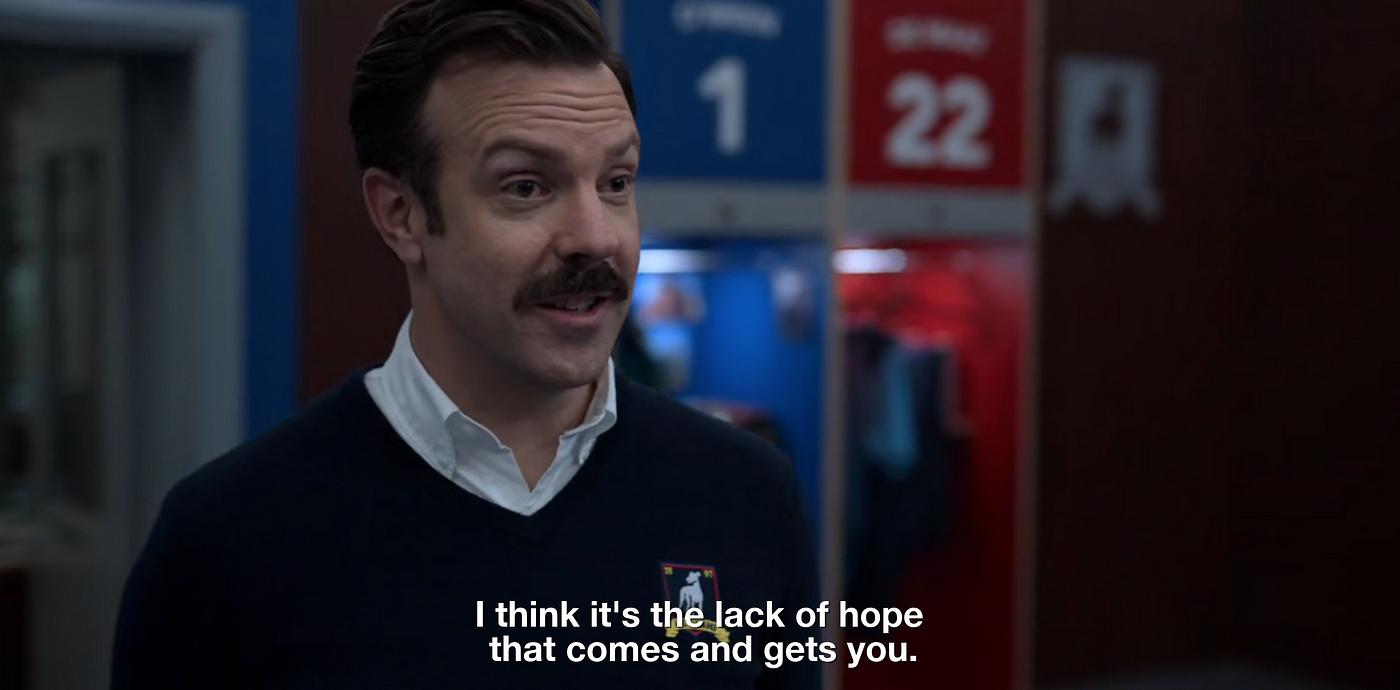After relating goal complexes to Ted Lasso's and Roy Kent's motivation and behavior, in this blog post, I will try to provide examples of how the attributions Ted and company have about certain outcomes or phenomena impact their perceptions and behaviors. As we learned in our readings and in class, our attributions, or what are understood as our interpretations of what caused certain events to occur in the fashion that they do, can have a significant impact on our sense of motivation and experience of certain emotions. Generally, attribution theory explains that individuals attribute the cause of all events through three dimensions: locus of control (internal vs. external), controllability (uncontrollable vs. controllable), and stability (stable vs. variant). When individuals attribute success (e.g., attributing to one's ability rather than luck) or failure (e.g., attributing to someone else's mistake rather than their own) as something that inherently involves them, can be controlled by them, and will be fairly predictable, it can understandably lead to different outcomes related to their perceived motivations and emotions.
Believe - The Lasso Way
Monday, November 6, 2023
The Harder You Work, The Luckier You Get
Friday, October 27, 2023
It's Not Just About (Scoring) Goals
Last week, we covered the topic of goal complex (or the complexity/nuance of goals) and explored relevant research that investigated how individuals' reasons for doing things influence the types of actual goals they develop and act on. Specifically, we were introduced to a framework in which aspects of self-determination theory (intrinsic or autonomous vs. extrinsic or controlled) were operationalized as the reasons or drive behind one's goals. Further, these motives behind one's goals then influenced what an individual is actually trying to accomplish, operationalized as achievement goals (mastery vs. performance; approach vs. avoidance). When individuals have more autonomous reasons for acting (interest, enjoyment, valuing others' improvement), they often will develop approach goals (working on skills, completing tasks) and experience positive results. On the other hand, when individuals have more controlled reasons for acting (external rewards, pressure from others), they will often develop avoidance goals and experience negative results if they engage in the activity at all. This framework helps to explain why performance approach goals occur and why these types of goals may be adaptive rather than maladaptive as previously theorized.
In thinking about goal complexes related to the motives, goals, and behaviors of Ted Lasso and other prominent characters in the series, one can create a decent illustration of how the relationship between motives, goals, and actions/outcomes can play out and, subsequently, be applied. Starting from the beginning of this goal complex model, let's consider the quality of Ted's motives or reasons behind his being a coach. As described in past blog posts, Ted does not appear to be motivated by extrinsic rewards, such as winning, money, or fame. Instead, based on Ted's words and actions, his motives seem to be quite intrinsic, as he truly values team camaraderie, connection, and self-improvement (extended to other domains besides sport performance). In line with research exploring goal complexes, which we reviewed in class last week, Ted's intrinsic motives tend to lead to his tendency to set approach goals rather than subscribe to avoidance goals or tendencies (e.g., . Even when Ted seems to have more of a performance goal than a mastery goal (being more cohesive as a team and organization than any other team in the league), Ted's intrinsic motives behind this performance goal induce an approach orientation rather than an avoidance orientation. For example, rather than ignoring their last place ranking or turning Jamie Tartt away for being a difficult team member, Ted approaches these tough situations by taking them head on (clearing heads with an underground sewer tour; bring Jamie back and allowing him to find his leadership role) due to his intrinsic valuing of developing cohesivity and improvement of his athletes. In turn, the team finishes near the top of the rankings and Jamie Tartt develops into both a star and a leader.
In examining the goal complexes of Roy Kent, one initially could understandably perceive that his goal complex process is conversely valanced as compared to Ted Lasso's. Roy Kent's motives behind participating in soccer and, eventually, soccer coaching appear to be more controlled than autonomous. Roy seems to be motivated by money, continuing to live out his fame, and wanting to avoid the negative feelings that could come from a life outside of soccer. In turn, Roy's goals, at least initially, seem to be quite avoidant. Roy avoids dealing with his retirement by ignoring the obvious physical and performance signs that his play is deteriorating and shouting others down who eventually point this out (including Ted). Further, Roy also sets out to avoid any form of vulnerability or intimacy with others. However, in line with the goal complex framework we learned about, once Roy begins to intrinsically value things like coaching (desiring to assistant coach for Ted), emotional intimacy (relationship with Keeley), and vulnerability with friends (joining the Diamond Dogs), he begins to not only change his goals from avoidance to approach, but also becomes a lot more approachable as a whole!
Sunday, October 15, 2023
Becoming The Best Version Of Myself
Self-determination theory holds that, like physiological needs, all humans innately seek out the satisfaction of their three psychological needs for autonomy, competence, and relatedness. The more that individuals perceive these three psychological needs to be satisfied by important social figures/climates in a specific context, the better their quantity and quality of motivation will be to engage in the specific behavior or activity. In terms of quality of motivation, a mini-theory within self-determination theory called organismic integration theory details how individuals' motivations can range in how intrinsic or extrinsic they are. While intrinsic motivation is conceived as being pure love or inherent value one attributes to a certain behavior/activity, extrinsic motivation can be further broken down into categories based on the extent one's motivation is internalized/externalized. When individuals attribute their motivation to engage in certain activities to external (money, removal of pain) and internal rewards (receiving more attention), they are typically considered to be more extrinsically motivated, and may not experience as strong persistence or positive well-being as individuals who are more intrinsically motivated (internalizing an activity as being important, or part of one's identity). Using a self-determination theory lens to analyze the Ted Lasso series, one can clearly see the influence of psychological needs on Ted's motivation, as well as how Ted's behaviors influence the satisfaction of psychological needs and motivations of his athletes.
Although sport psychology research has incorporated self-determination theory to explore psychological needs and motivation regulation of athletes, recent research has indicated the importance of coaches' perceptions of psychological need satisfaction and motivation. In terms of Ted's motivation for coaching, I would suggest that Ted's is quite intrinsic, or at least identified/integrated. The fact that Ted's ultimate goals have nothing to do with extrinsic rewards, such as fame, money, or winning games, and instead predominantly relate to his strong belief in creating an environment to help him and others reach their potential strongly indicate Ted's motivation is intrinsic. Ted simply values being a coach and has internalized and arguably even transfers his coaching identity to other areas of life. Making sense of Ted's intrinsic motivation by analyzing how he may perceive his needs as satisfied further backs up that Ted would most likely have high quality motivation. Ted's satisfaction of the need for autonomy would presumably be quite high, as he is the head coach and the owner of the team gives him ample opportunity to lead the team the way he sees fit. His competence satisfaction would also presumably be quite high as a coach, as he had just led his previous team in America to a NCAA title, and his detractors in the UK grow quieter throughout the series as the team improves. Last, Ted's need for relatedness also appears to be satisfied through his relationships with Coach Beard, club's personnel, and the his athletes, despite aspects of his personal life most likely contributing to some relatedness frustration. Thus, it is logical to assume that Ted's motivation to coach is mostly intrinsic.
Friday, October 6, 2023
"Smells Like Potential"
To complete our understanding of the Expectancy-Value Theory, we explored how values, perceptions, and cultivated interests interplay with perceptions of self-efficacy, subsequently shaping our motivation to act. As I described in last week's blog, determining Ted Lasso's perceptions and sources of coaching self-efficacy was not as easy as it had initially seemed. He did not appear particularly phased by losing, despite being head coach of the professional soccer team. However, considering the topics of this week, I believe one must understand Ted's overarching values to accurately assess his coaching self-efficacy or sources of motivation.
Friday, September 29, 2023
Is It The Hope That Kills You?
This week's course readings covered the first half of Expectancy-Value theory, and specifically, the expectancy aspects of an individual's motivation. As we learned, expectancy can be further divided into efficacy expectations (or perceptions that one has the personal resources to execute an action) and outcome expectations (or perceptions that one's action or attempt will lead to the desired outcome). Efficacy expectations can also be understood as an individual's sense of self-efficacy, or their perception that they are able to successfully navigate a task, regardless of the challenges they must mitigate. To be clear, as I understand it, self-efficacy is distinct from similar words like competence, in that self-efficacy is not simply believe that oneself is good at a specific task. Rather, self-efficacy includes a belief in oneself and a personal, task-specific resilience that allows one to bounce back quickly from setbacks.
If you have ever watched the TV series Ted Lasso, you may initially think that relating the concept of self-efficacy to Ted's behavior and mindset is quite easy. Ted is full of self-efficacy! Everything he does seems to emerge from a sustained belief in himself and a complete lack of doubt in himself or his friends and team. However, Ted's self-efficacy and, in turn, motivation to coach, never seem to wane, which makes the concepts and their connection quite the difficult phenomena to understand in his context. In fact, the only period in which it seems that Ted is questioning his purpose or motivation to continue coaching professional English soccer is not after crushing failure, repeated insults about his performance, or even literal panic attacks (all of which could be considered antecedents leading to low self-efficacy). Rather, it is after successfully leading his team out of relegation, and to the top of the Premier League standings (when one's perceptions and displays of self-efficacy would presumably be at their highest) that Ted's motivation to stay seems to decrease.In some ways, I believe that Ted has developed something along the lines of an alternative dimension of learned helplessness, which refers to a perception of a lack of control and subsequently doing nothing to end one's suffering due to this perceived lack of control. Rather than being compelled towards helplessness and inactivity due to feeling out of control, though, Ted almost appears as though he is compelled towards positive belief and action in order to regain control. It may be my background in psychology and tendency to pathologize behavior, but considering the heavy subject of Ted's father's suicide while Ted was a young teenager and his wife divorcing him from another continent, it is possible that Ted has internalized and reinforced a lack of control from a young age. Thus, rather than agency (i.e., capacity to achieve/accomplish one's goals) and pathways (i.e., multiple controllable options to achieving goals) providing Ted with a sense of hope, I wonder if Ted has developed a compulsion towards hope and positive thinking to cope with his sense of lacking agency/control and to motivate himself to develop multiple pathways to accomplish his goals. However, this hypothesis does not necessarily explain why Ted's self-efficacy appears less related to his motivation than outlined in our readings, and I believe next week's readings about values may help to explain this disconnect.
Friday, September 22, 2023
Letting Yesterday Get In The Way Of Today
If any of the characters in the show Ted Lasso were to take this class and learn about appraisal theories of emotion, I would not blame them for initially doubting the existence of Ted’s appraisal process and concluding that, regardless of the situation, Ted is biologically inclined to react with positivity. As I mentioned in my previous post, Ted’s ex-wife even cites this compulsive optimism and positive energy among the primary reasons for needing space and eventually asking for a divorce.
Though, as the show progresses, it becomes clear that Ted’s seemingly automatic emotional reactions of joy, interest, and hope are calculated, and that Ted is, in fact, quite capable of experiencing and reacting to negative emotions. Assumedly due to the stress of being separated from his son and after begrudgingly finalizing the divorce with his ex-wife, Ted begins to experience panic attacks when reminded of his family. This reaction is, of course, understandable; however, Ted’s onset of panic attacks points to the relevance and significance of subjective appraisals in the experience of emotions. Ted’s primary and secondary appraisals of the situation moved from non-threatening and controllable (e.g., working out his relationship with Michelle, remaining close with Henry) to highly threatening and uncontrollable (e.g., Michelle divorcing him, potential new father figure for Henry). In turn, thoughts about his family began to induce experiences of severe anxiety and fear rather than comfort and hope.
Michelle and Henry later travel to visit Ted in England, and Michelle brings her then-long-term boyfriend, who also happened to be Ted and Michelle’s marriage counselor prior to their divorce. Although Ted automatically displays his typical positive affect and demeanor, when Michelle lets Ted know that her boyfriend is taking her on a trip to Paris, Ted’s thoughts and resulting emotions begin to spiral. He becomes convinced that Michelle’s boyfriend is going to propose to her in Paris, and that he will lose Michelle and, most importantly, Henry for good. Despite the assurances from his friends that the Paris trip most likely means nothing and that he should enjoy the time he now has with his son, Ted’s subjective appraisal of the situation as a significant threat cannot be dissuaded. His panic, anger, and paranoia led him to desperately ask his boss to hire a private investigator and follow Michelle to Paris. Luckily, Michelle returned without a new ring on her finger and Henry pointedly ignored Michelle’s boyfriend’s greetings. Upon a re-reappraisal of the situation as non-threatening and a visit with the team sport psychologist, Ted’s panic attacks subsided and he merely had to deal with the embarrassment of letting his appraisals get the best of him.
Although I touched on it briefly, I could not figure out how to discuss Ted’s proclivity to engage in what some might consider “toxic positivity” in this post, but I hope to address this phenomenon more comprehensively in coming blog posts. Until then, thank you for reading!
Friday, September 15, 2023
We Value Relationships!
Much like any other human being, though, is that Ted's goals are dynamic and may not always be perfectly clear or understandable. In fact, Ted can behave quite enigmatically as a head coach in a major professional sport, considering he often explains that he is not concerned about winning. Instead, Ted's unstated objective is to facilitate a sense of family, trust, and vulnerability among the entire organization (from owner, to players, to kit manager), and to support his athletes and fellow coaches in realizing their full potential, on and off the field. Considering my background in sport psychology, my interest in coach/instructor-created motivational climate, and the warm feeling I got from watching this show, I am very excited to analyze it in a motivational/emotional light over this semester.
The Harder You Work, The Luckier You Get
After relating goal complexes to Ted Lasso's and Roy Kent's motivation and behavior, in this blog post, I will try to provide exampl...

-
This week's course readings covered the first half of Expectancy-Value theory, and specifically, the expectancy aspects of an individua...
-
To complete our understanding of the Expectancy-Value Theory, we explored how values, perceptions, and cultivated interests interplay with p...
-
I f any of the characters in the show Ted Lasso were to take this class and learn about appraisal theories of emotion, I would not blame the...

















